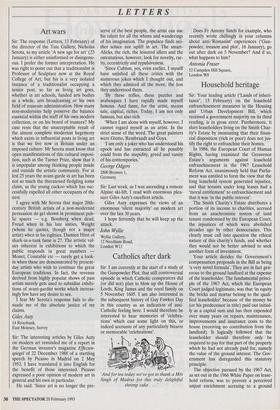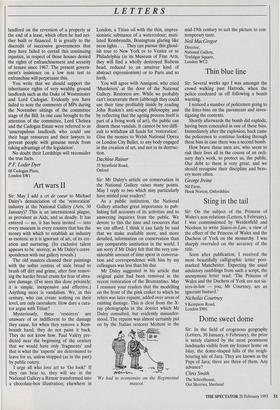Household heritage
Sir: Your leading article (`Lands of inheri- tance', 13 February) on the leasehold enfranchisement measures in the Housing and Urban Development Bill, which received a government majority on its third reading, is in gross error. Furthermore, it slurs leaseholders living on the Smith Char- ity's Estate by insinuating that their finan- cial disposition (rich or poor) does not jus- tify the right to enfranchise their homes.
In 1986, the European Court of Human Rights, having examined the Grosvenor Estate's arguments against leasehold enfranchisement in the 1967 Leasehold Reform Act, unanimously held that Parlia- ment was entitled to form the view that the long leasehold system generated injustice, and that tenants under long leases had a `moral entitlement' to enfranchisement and that it was 'in the public interest'.
The Smith Charity's Estate distributes a portion of its income to charities, accrued from an anachronistic system of land tenure condemned by the European Court, the injustices of which were abolished decades ago by other democracies. This clearly must call into question the ethical nature of this charity's funds, and whether they would not be better advised to seek another form of investment.
Your article derides the Government's compensation proposals in the Bill as being `a very novel formula'. They are in fact gen- erous to the ground landlord at the expense of the leaseholder. The fundamental princi- ple of the 1967 Act, which the European Court judged legitimate, was that 'in equity the bricks and mortar belong to the quali- fied leaseholder' because of the money he (or his predecessor in title) paid out initial- ly as a capital sum and has then expended over many years on repairs, maintenance, improvements and insurance costs to the house (receiving no contribution from the landlord). It logically followed that the leaseholder should therefore only be required to pay for that part of the property which he had not already paid for, namely the value of the ground interest. The Gov- ernment has disregarded this statutory principle.
The objective pursued by the 1967 Act, as set out in the 1966 White Paper on lease- hold reform, was to prevent a perceived unjust enrichment accruing to a ground landlord on the reversion of a property at the end of a lease, which often he had nei- ther built or financed. It is greatly to the discredit of successive governments that they have failed to curtail this continuing injustice, in respect of those houses denied the rights of enfranchisement and security of tenure since 1967. The present govern- ment's insistence on a low rent test to enfranchise will perpetuate this.
You write that we should support the inheritance rights of very wealthy ground landlords such as the Duke of Westminster and Lord Cadogan. Evidently you have failed to note the comments of MPs during the November sittings of the committee stage of the Bill. In one case brought to the attention of the committee, Lord Chelsea and the Cadogan Estate were referred to as `unscrupulous landlords who could use their huge resources and their lawyers to prevent people with genuine needs from taking advantage of the legislation'.
No doubt their Lordships will reconsider the true facts.
P.F. Loder Dyer
68 Cadogan Place, London SW1



























































 Previous page
Previous page